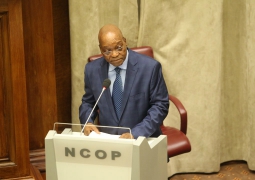
Every year, the President [Jacob Zuma] addresses the National Council of Provinces (NCOP) and the Premiers of provinces to highlight the progress made in achieving the commitments he made during his State of the Nation Address (Sona). This debate is one of the instruments the NCOP utilises to ensure that the executive accounts to the needs and concerns of provinces. And it elevates the NCOP as a custodian of the inter-governmental mandate that it is invested with by the Constitution.
In keeping with the letter and spirit of this debate titled: “Deepening unity in action for inclusive growth and Africa’s renewal – reclaiming the legacy of OR Tambo”, the President said it was important to look back on the road travelled on the journey to delivery and a promise of a better life for all our people, especially the poor and the working class majority, he said.
“In 2009 I said we wanted to build a caring government, a government that knows where people live and which does its best to improve their lives –working with them. A lot has been done this year to achieve that goal, in spite of difficult economic conditions. It’s pleasing to note that the celebration of the fifth anniversary of the National Development Plan in September was greeted with great news of a positive growth in our economy that took us out of technical recession,” he said.
“This was a significant affirmation, which encouraged us to focus on positive developments and provide the necessary support to the sectors that can help us reignite growth. If we continue in this path, our nation will reap the economic benefits and there will be significant change in the living conditions of our people."
Most critical is the need to provide support to sectors such as mining, manufacturing, telecommunications and others that can ignite growth. This could help in curbing the rising unemployment rate among the youth of this country, especially those in townships and rural areas, he said. “The National Rural Youth Service Corps which was established in September 2010 empowers youth from rural areas. More than 7 000 youth have gained various skills. Government also runs the War on Leaks programme aimed at fighting water leakages while providing youth with skills as plumbers and in various artisan trades.”
Of most importance are government strategies that seek to bring about an inclusive economy, at the heart of it is the radical economic transformation, he said. “We have introduced programmes such as promoting and supporting black industrialists and black small businesses so that we can change the patterns of ownership of the economy. This is an example of what we mean by radical economic transformation.”
The appearance of the President before the NCOP during the year in which we celebrate 20 years since the inception of our Constitution and the establishment of the NCOP, reminds us the hard work that OR Tambo put into writing the Harare Declaration that led to our new democratic transition, said the Chairperson of the National Council of Provinces, Ms Thandi Moodise. “This year marks our country’s ability to negotiate its future. And this debate can be looked in that vein,” she said.
“This year we remind ourselves that our strength as a country has always been our ability to talk, to discuss, converse, argue, negotiate and find one another. This Constitution is the product of finding one another, hearing and reasoning together.”
It is this very Constitution that created the NCOP, that sought to ensure that the views of all South African citizens are heard and acted upon, she said. “The NCOP has enabled every citizen or person living within our borders to petition us, to present and to put whatever concerns they might have to Parliament.”
Invoking OR Tambo’s role in the establishment of our Constitution and our Parliament, he asked rhetorically, “what would Tambo say to us today? He would instruct us to listen more carefully to the people. He would ask us if we really understood the importance of Parliament, and why it was necessary to have it entrenched in our Constitution”.
However, Mr Leon Magwebu begged to differ. He condemned vehemently the economic performance of our country under President Jacob Zuma’s stewardship. “It is estimated that R100bn is owned to the fiscus or has been lost through state capture and nine million South Africans remain unemployed, all this is happening under your watch.”
But a more optimistic outlook at our country’s growth potential, in a similar vein to that of the President, that hinges on infrastructure investment and the determination to create an egalitarian society was advanced by the MEC of Health in Free State Province, Mr Butana Komphela. “Massive infrastructure investment in the economy must be more than just the building of roads, railway lines, dams or electricity plants, but it must be about building skills, job creation and the industrialisation of our country. As well as the transformation of the ownership our economy that brings us close to the ideals of an egalitarian society.”
A differing opinion to the notion of the egalitarian society in the current economic climate was brought to bear by Mr Mntomuhle Khawula. He based his argument on the Mid-Term Budget Policy Statement presented to Parliament by the Minister of Finance recently. “The inequality gap has widened significantly during your time. The economy has struggled enormously with some industries relocating away from South Africa and some mining industries shedding jobs and closing down. The country’s debt has increased significantly. The Mid-Term Budget Policy Statement was a clear indication of how bad the situation has become.”
By Abel Mputing
15 November 2017

